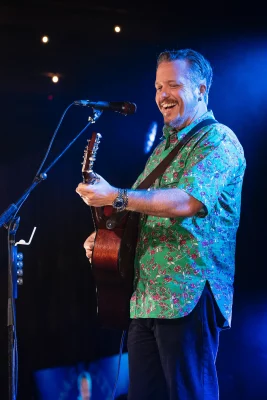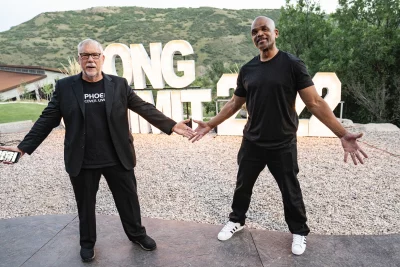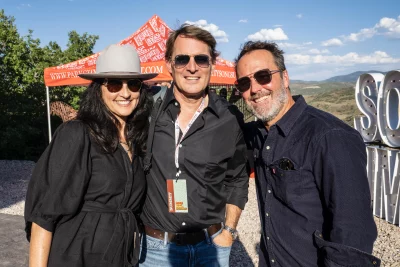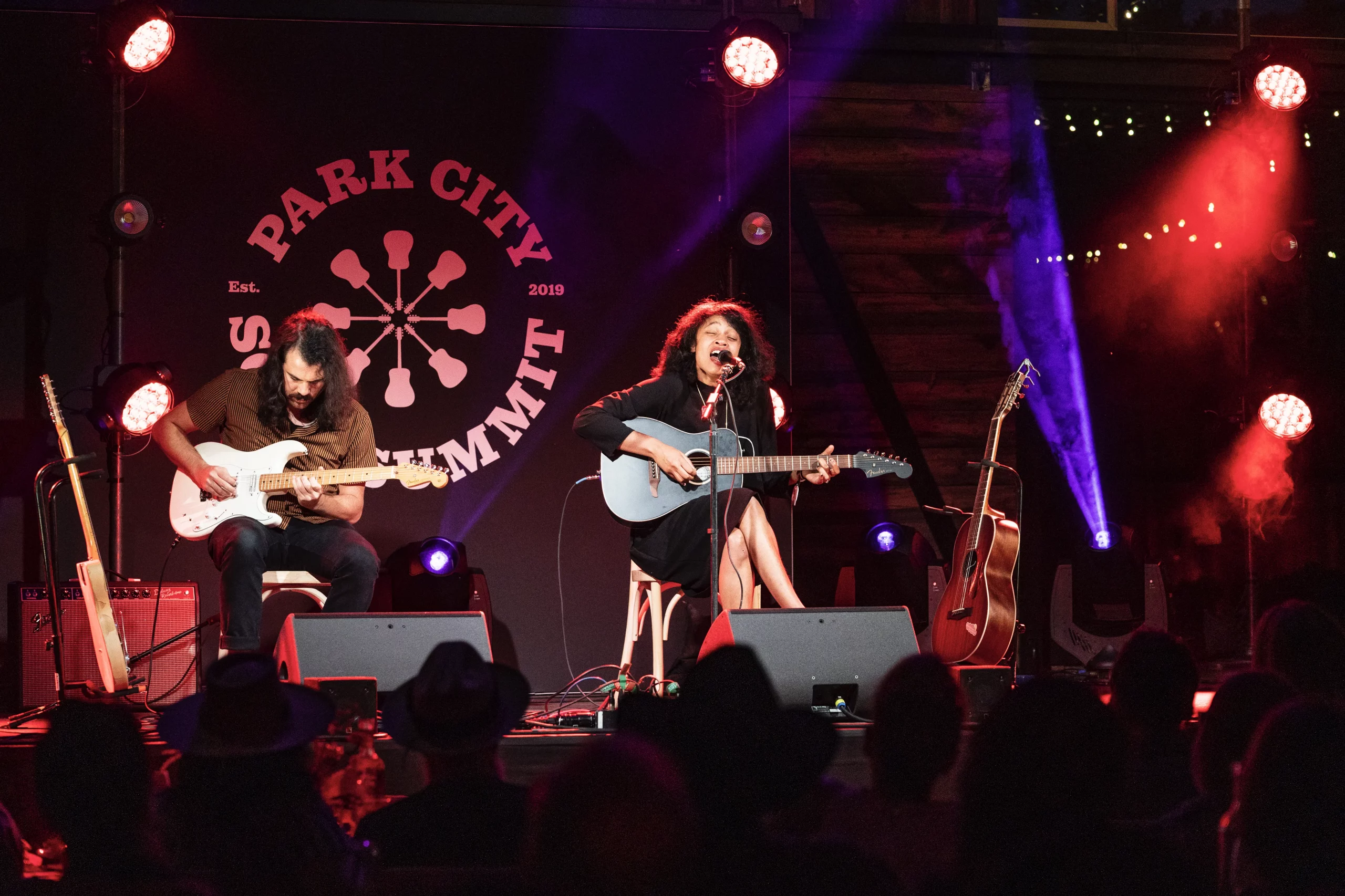Music on the Mountain: Second Annual Park City Song Summit
Music Interviews
The second annual Park City Song Summit (PCSS) is back Sept. 7–9, and this time it’s found a brand new home at the Canyons Village Resort. The lineup this year is full of promise. With names such as Bobby Weir and the Wolf Bros., Adia Victoria, Celisse, Ramblin’ Jack Elliott, Cimafunk and more, it’s hard to go wrong.
In line with the Summit’s mission of wellness and inclusivity, the event boasts a number of intimate panels (called Summit Labs), with conversations ranging from discussions of mental health within the music industry to examining the legacy of hip-hop to uplifting country artists of color. According to Founder and “captain of the ship” Ben Anderson, “If you love storytelling, you’ll love Song Summit.”
“If you love storytelling, you’ll love Song Summit.”

Anderson expounds further, saying “Inclusivity to me means as wide a net as it can be cast, and that is ensuring that we have a lineup of Labs and programming that is reflective of our society. It’s celebrating our differences, finding common ground and moving the human experience forward through love, connection, community and mindfulness.”
Blueswoman and poet Adia Victoria will return to PCSS with two panels: “Porch Talking The Blues,” which examines the Black, Southern, femme roots of the genre, and “How She Move,” a traditional performance highlighting the poetics of blues. Victoria said she’s looking forward to continuing the community building that began at last year’s Summit, especially given that for the last year her artistic mind has grappled with expanding how others, namely White audiences, have historically engaged with the blues.
“It’s celebrating our differences, finding common ground and moving the human experience forward through love, connection, community and mindfulness.”
“I wanted to deepen the context of the blues, to flush out the poetics of it, the politics of the blues, the radical community of Black Southern women that bore the blues and that embody the blues,” Victoria says. “I was just like, ‘How do I combine all of these thoughts that I’m having and different facets of the blues that have impacted me as an artist, as a Black Southern woman?”
Her panels are the answer. Victoria says she’ll be drawing from Angela Davis’ blues legacy and Black Feminism in her conversations, saying that it’s an honor and a privilege to pay homage to the women that have come before her.
“The blues has given us the space to claim ownership of not just our voices, but our bodies, our flesh, occupying our flesh and owning our perspective, our gaze upon the world,” Victoria says. “That’s what I try and bring with myself when I’m in these White spaces—even if I’m the only Black artist present, I’m not alone. I am in community with my blues-women no matter where I go.”
“The blues has given us the space to claim ownership of not just our voices, but our bodies, our flesh, occupying our flesh and owning our perspective, our gaze upon the world”

Victoria says that ownership in and of itself is “very challenging and dangerous” to a system that values Whiteness, but that’s what she’s trying to speak to with her panels. Politics are “the water we swim in,” and as such, Victoria can’t divorce herself or her art from it. At the same time however, Victoria says she can’t let solely politics define her, leading to the need for a “delicate balance.”
“You have no power on how people are going to perceive you,” Victoria says. “I think that the only way to change things is more people owning their identity, owning their subjectivity, where it becomes undeniable that there is no normal.”
When speaking with predominantly White audiences, Victoria says she likes to turn the lens back on them, asking audiences to engage critically with their own identities—something she says White individuals are rarely asked to do in a world that constantly reaffirms them.
“I think that the only way to change things is more people owning their identity, owning their subjectivity, where it becomes undeniable that there is no normal.”
“That is the trick to it. It’s to never take “White humanity” as the default. They are just as racialized as I am,” Victoria says. “So in that way, I keep myself from feeling too peculiar, from feeling too ganged up on, because I’m able to locate them and I can describe them. I’m not just an object to be described—I’m a describer as well.”
Victoria says her panels are “an invitation into the blues”—the kind of challenge to the accepted status quo that underlines every aspect of Song Summit.
“I think that it’s time that we put the teeth back into the blues,” Victoria says. “This is a challenge that we are issuing to them to let the blues lead them into your own self, into your own inner strangeness, into your own denied and silenced realities.”
“I think that it’s time that we put the teeth back into the blues.”

After this year’s Song Summit, Victoria says she hopes her attendees leave with an expanded sense of self-compassion. “I hope that they feel seen and exposed for the first time by a performance,” she says. “I hope they feel implicated walking away from that. I hope that I walk away knowing that I’ve done my ancestors proud.”
Anderson notes that PCSS is not a festival and that there’s a reason the word isn’t in the name. The event stems from Anderson’s passion for music and a desire to normalize struggles that the music industry tends to overlook—namely, mental health and recovery from addiction. Executing the vision of PCSS hasn’t been an easy journey, and Anderson credits his background as an attorney for giving him the confidence to keep going. Still, it’s the continued call for safe spaces like PCSS that keep Anderson dedicated to the mission.
“I believe that it’s necessary, because … I hear all of the people from different aspects of the ecosystem of live music touring saying it: We need this.”
“I truly believe in it,” Anderson says. “I believe that it’s necessary, because … I hear all of the people from different aspects of the ecosystem of live music touring saying it: We need this.”
For Anderson, the vulnerable, compassionate environment PCSS fosters also helps him on his own recovery journey. There’s a lot to look forward to at this year’s event, and Anderson’s reward comes from the people, whether that’s one person leaving inspired or 5,000.
“People come, they’re impacted, they’re changed in some way, and people leave perhaps more mindful, loving, kind and inspired,” Anderson says. “That’s a success.”
Find tickets for Park City Song Summit, running Sept. 7–9, at parkcitysongsummit.com.
Read more concert coverage here:
Mind the Gap Fest: A Conversation with Boyish and 26fix
Skinny Puppy @ The Complex 5.04
